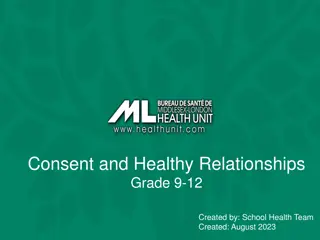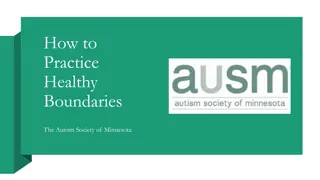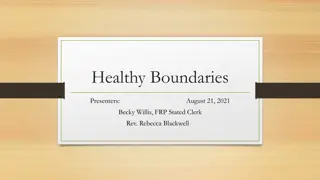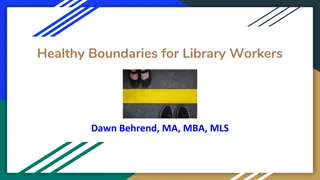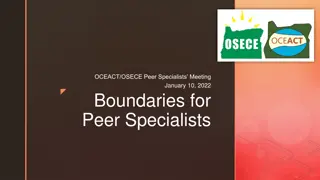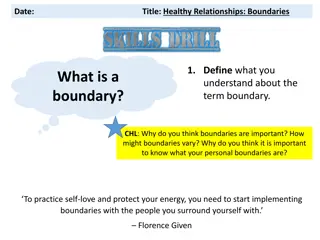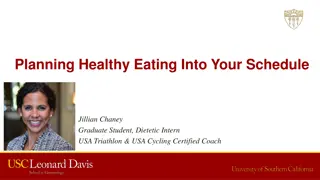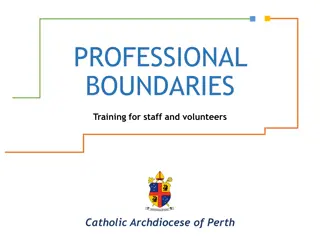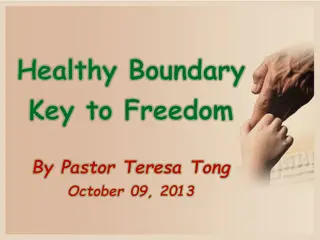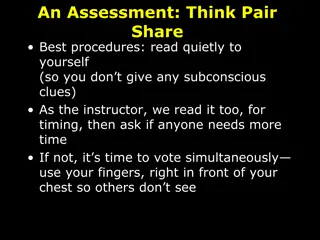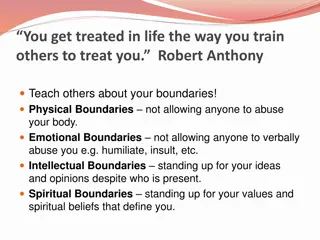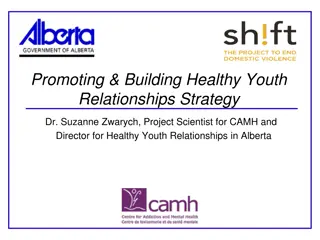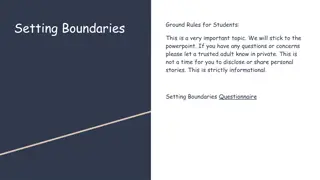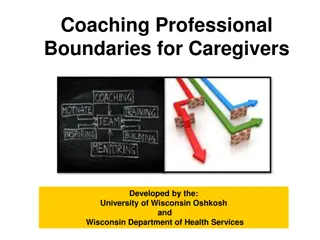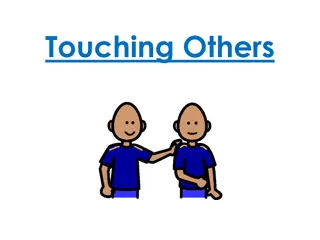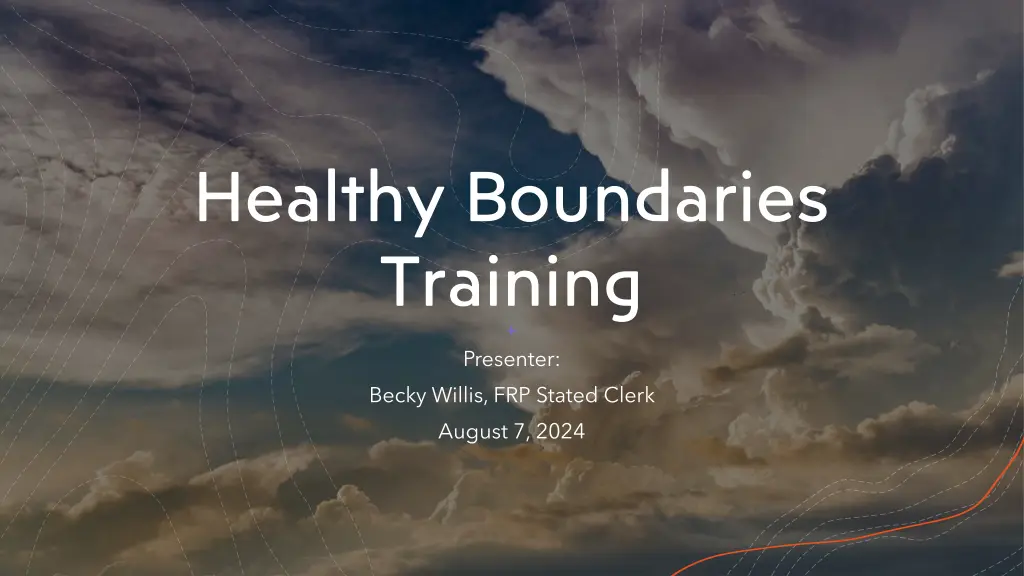
Understanding Healthy Boundaries Training Importance
Explore the significance of healthy boundaries training as mandated by the Book of Order, covering policies on sexual misconduct, harassment, youth protection, and more. Learn why setting personal boundaries is crucial for self-care and effective ministry. Stay updated on the essential training requirements every thirty-six months.
Download Presentation

Please find below an Image/Link to download the presentation.
The content on the website is provided AS IS for your information and personal use only. It may not be sold, licensed, or shared on other websites without obtaining consent from the author. If you encounter any issues during the download, it is possible that the publisher has removed the file from their server.
You are allowed to download the files provided on this website for personal or commercial use, subject to the condition that they are used lawfully. All files are the property of their respective owners.
The content on the website is provided AS IS for your information and personal use only. It may not be sold, licensed, or shared on other websites without obtaining consent from the author.
E N D
Presentation Transcript
Healthy Boundaries Training Presenter: Becky Willis, FRP Stated Clerk August 7, 2024
Why Do We Have Boundary Training? +The Book of Order (G-3.0106) requires that All councils shall adopt and implement the following policies: a sexual misconduct policy, a harassment policy, a child and youth protection policy, and an antiracism policy. Each council s policy shall include requirements for boundary training which includes the topic of sexual misconduct, and child sexual abuse prevention training for its members at least every thirty-six months. Our training will cover all these policies. Aside from the requirement for training, it is a best practice and keep boundaries, including self-care, in our lives. best practice to set
Boundaries, Boundaries, Everywhere! +Boundaries are fundamental structures that establish and preserve identity. Boundaries protect the essential nature of things, while also contributing to their definition. +Respecting boundaries is so essential to our spiritual life that it is a key part of the prayer Jesus taught us to pray forgive us our debts (trespasses) as we forgive our debtors (those who have trespassed against us). Violating boundaries breaks down the community of faith, while respecting boundaries builds it up. Boundaries set limits on behavior in order to protect things of value, and of particular value are people made in the image of God.
Setting Personal Boundaries for Self-Care + Failure to set and maintain personal boundaries is the number one ministry problem, according to a study at Fuller Theological Seminary. + It is essential to have goals in ministry, but it is hard to be proactive toward those goals without boundaries. If you don t stick to your personal boundaries, you may become like the little Dutch boy who kept running, helter-skelter, trying to halt leaks in the dyke by plugging his finger in one leak after another. Healthy personal boundaries help to reach goals, not hinder them. + If you ignore your car s check engine light, you will probably find yourself stranded on the side of the road somewhere. If your personal check engine light has come on, then it may be time to consider changes to make your life full, healthy, and balanced. Take time for yourself and your family. Beware the tyranny of the urgent (everything is not an emergency!). Make clear, measurable boundaries and share them with the appropriate people. Take better care of yourself. Take better care of your family. By doing this, you will take better care of those to whom you minister. You have been called by God into ministry. Your covenant relationship with Him is the most important relationship you have! + For everything there is a season, a time for every activity under heaven. Ecclesiastes 3:1
Boundaries Training Policy +According to already established policy, and in accordance with new requirements of the Book of Order, training on Sexual Misconduct Prevention, Child and Youth Abuse Prevention, Anti-Harassment, Antiracism, and Self-Care will be required every thirty-six months for all Inquirers, Candidates, Ministers of Word and Sacrament (Teaching Elders), Commissioned Pastors (Commissioned Ruling Elders), Trained Ruling Elders, Christian Educators, Campus Ministers, and Youth Directors. The last Healthy Boundaries Training was August 21, 2021, so today s training meets the thirty-six months requirement. +For any person coming into the presbytery, a certificate of completion of boundaries training from another presbytery may be accepted if it includes all of the above policies. Any person coming into the presbytery or receiving training at work (such as a chaplain) will be required to have a signed attestation that training has been done in all the required areas listed above.
Anti-Harassment Policy + Harassment may be overt, perceived, insinuated, or in other forms. Harassment can be expressed as sexual harassment, defined for the policy of the Presbyterian Church (U.S.A.) as any offense involving sexual misconduct in relation to any person under the age of eighteen years or anyone over the age of eighteen years who does not have the mental capacity to consent; or any person when the misconduct includes force, threat, coercion, intimidation, or misuse of ordered ministry or position. + Harassment can also be expressed by persons in authority creating a hostile environment outside the definition of sexual harassment. Harassment can also be expressed by persons not in a position of authority. Harassment can occur between colleagues, parishioners, students, members of congregations, session members, or others. Flint River Presbytery s policy is that no person shall engage in any form of harassment and/or unwelcome conduct by anyone else within our bounds. + What to do if you feel harassed? First, state your perception of harassment to the person you feel is harassing you. Sometimes directly addressing the issue will result in reconciliation. If that is not effective, report the harassment to the council or person responsible for addressing the issue. For example, a parishioner would report this to the pastor, who may also include the session in dealing with the issue. A minister (Minister of Word and Sacrament or Commissioned Pastor) should be counseled by the session, who may also report this to the Stated Clerk of the presbytery and/or to the Committee on Ministry. Staff of a congregation should report this to the pastor. If the pastor is alleged to be the one harassing, staff of a congregation should report to the session. Staff of the presbytery should report this to the Executive Presbyter and/or the Personnel Committee. No one should have to deal with harassment alone, so any questions should be directed to the Stated Clerk and/or the Committee on Ministry.
Antiracism Policy + For there is one body and one Spirit, just as you have been called to one glorious hope for the future. There is one Lord, o For there is one body and one Spirit, just as you have been called to one glorious hope for the future. There is one Lord, one faith, one baptism, one God and Father of all, who is over all, in all, and living through all. Ephesians 4:4 faith, one baptism, one God and Father of all, who is over all, in all, and living through all. Ephesians 4:4- -6 6 ne + In order to lead our congregations, youth ministries, and the presbytery in a quietly courageous way, we must first tell the honest story of the present reality. The honest story is a gateway to becoming how we are now learning to be. But we must not forget the old story and must allow all our brothers and sisters in Jesus to tell their story so we can also find ourselves in that story as well. The command of Jesus that we love one another, should compel us to listen carefully, to care deeply, and to go forward into the future together. For this reason, all are welcome to gather once a month for Courageous Conversations About Race. During this online gathering, siblings are invited into the safe space of conversation about the honest story, the old story, and the story which we write together in love. Stories, experiences, and feelings help us to better understand each other and to draw even closer as Christians. + As Presbyterians, our commitment to unity is one of our foundational beliefs (Book of Order-F-1.0403). This unity overlays many aspects of our life together, but one of those concerns the subject of race, specifically racism. + Flint River Presbytery has adopted a policy addressing racism with the goal that no person of any race should feel the hurt of racism. Our policy states that the presbytery shall intentionally work to recognize and address cultural differences, implicit bias, and racism both through interpersonal relationships and in the organizational structure and remove barriers so that all people within the bounds of Flint River Presbytery may enjoy the richness and complexity of Christ s Church. + We firmly stand on the commitment that all aspects of the life of the presbytery shall reflect the racial diversity within our presbytery. The Committee on Representation works closely with the Nominating Committee to assure that there is diversity in the election of officers and committee members, but each of us has an individual responsibility in obedience to the Lord s command to love, accept, and be in fellowship with ALL the saints within our presbytery regardless of race.
Prevention of Sexual Misconduct Boundary Awareness + While congregants need to feel that their counseling sessions are confidential, it is important to note that confidentiality and secrecy are not the same. Misuse of confidentiality by clergy and other church leaders or by those being counseled can be serious, and those doing counseling must be ethical as well as astute. + In general, adults have more power than children and youth. + Whether in truth or by perception, pastors and church leaders have more power than people with whom they have a pastoral/leadership relationship. + The mutuality of friendship cannot exist when there is a disparity of power. + For the safety of all concerned, at least two unrelated adults should be present and maintain visual contact with each other as they engage in ministry to children and youth, whether in the church or on trips, where more adults may be needed as chaperones. + Doors should remain open or at least have windows to protect children and youth as well as those ministering to them. Counseling with adults is best done in a similar fashion, but at least conducted when there are others in the church and in the general area of the office or room where counseling is done. + Very intentional care should be exercised with pastoral counseling to avoid even the appearance of impropriety or to provide an opportunity for improper behavior on the part of either person (counselor or counselee). + Social networking has become a daily activity for many people, especially young people, and this should be just as transparent as an open door or window in the door of a physical building. All church leaders, teachers, youth directors, etc., should be especially careful of what is put on social media. Youth leaders should be alert to any inappropriate activities by youth while at the church or at church-sponsored activities. + Church technology (websites, computers, cell phones, tablets, etc.) should never be used to access inappropriate content.
Is Your Church Safe? Children and Youth Abuse Prevention + Let the little children come to me; do not stop them; for it is to such as Let the little children come to me; do not stop them; for it is to such as these that the Kingdom of God belongs. Mark 10:14 these that the Kingdom of God belongs. Mark 10:14 +The Book of Order provides that all councils of PCUSA must have sexual misconduct policies and children and youth protection policies. Here are a few concerning statistics about abuse and the consequences: +80 percent or more of abuse is never reported. +Abuse can shatter a child s well-being and sense of trust. +Sexual predators seek trusting environments (like churches) where children are present. +Allegations of abuse threatens the church s mission and reputation. +Court awards in abuse cases can cost churches millions of dollars.
State Law and Community Resources + Georgia (and other states) mandates reporting of suspected abuse by specific people who have contact with children. The Book of Order also speaks to Mandated Reporting (G-4.0302). + Mandated reporters who report suspected abuse in good faith are protected by law, even if the reported is not substantiated by the Department of Family and Children Services (DFCS) or another reporting agency. All reports are confidential, and the reporter may remain anonymous, if so desired. It is the responsibility of DFCS and law enforcement to investigate the allegation of child abuse. + In addition to child abuse, adult abuse also occurs. Although the laws are different for mentally capable adults (who may refuse intervention by DFCS), reporting of suspected abuse or neglect may be prudent. + College students who are at least 18-years-old are considered adults and may also refuse intervention. Nevertheless, suspected abuse should be addressed with the student, if appropriate, or reported as with any other suspected abuse. + To assist in avoiding the opportunity for abuse as much as possible, Flint River Presbytery works with PNCs, sessions and congregations to access background checks, which should be completed on all employees and any volunteer who works with children. + IMPORTANT: Reporting of allegations of abuse or misconduct within the church may occur in many ways. Because a congregation, session, presbytery, or any council cannot control to whom the alleged victim of misconduct or abuse speaks to first, it is important that pastors, officers, elders, employees, and volunteers understand how to channel reports of incidents. Section D of the Book of Order (Church Discipline) goes into great detail about the procedures of an official allegation of misconduct. The procedures of Church Discipline do not do not substitute for the mandatory reporting requirements of the State of Georgia. Make sure to include this information as part of the new worker orientation, including orientation of volunteers.
Learning to Lead Like Jesus + And so, dear brothers and sisters, I plead with you to give your bodies to God because of all He has done for you. Let them be a living and holy sacrifice the kind He will find acceptable. This is truly the way to worship Him. Do not copy the behavior and customs of this world, but let God transform you into a new person by changing the way you think by changing the way you think. Then you will know God s will for you, which is good and pleasing and perfect. (I Cor. 12:1-2, emphasis mine) + Lead with humility, love, accountability, relationships, teachability, discipline, gratitude, generosity, forgiveness, encouragement, and, last but certainly not least, faithfulness. + Faithful servants never retire. You can retire from your career, but you never retire from serving God. (Warren) + Lead with thanksgiving for the grace showered upon us and by the example of the Lord Jesus, who gave Himself for us and lives forever making intercession for us with the Father. If we learn to lead like Jesus, our lives will be a sacrifice of praise to God and bring honor to His holy name.
Resources and References +Book of Order of the Presbyterian Church (U.S.A.) +Insurance Board Pracsidium, Inc. (PCUSA) +Books: +Boundary Setting for Clergy and Ministry Workers by Dr. Jim Stout +Learning to Lead Like Jesus by Boyd Bailey +Quietly Courageous by Gil Rendle +Confidentiality and Clergy: Churches, Ethics and the Law by William W. Rankin +The Integrity of the Body of Christ by Arden F. Mahiberg and Craig L. Nessan

